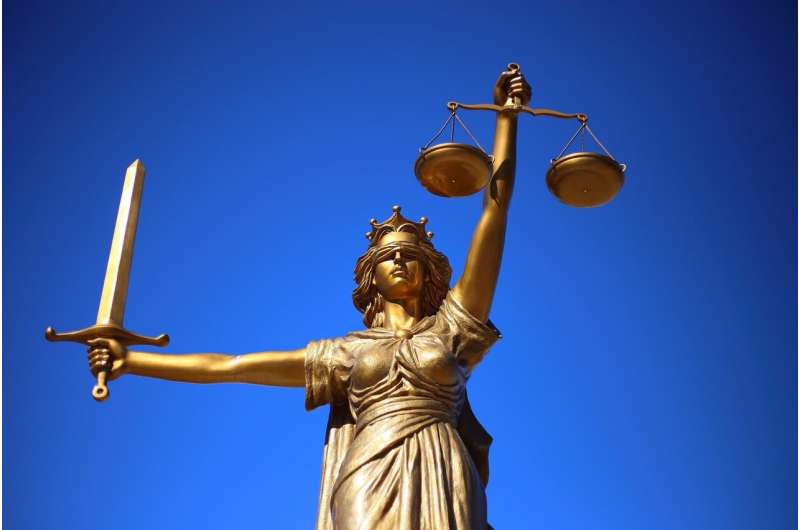New study finds 'pedophile hunter' groups violate human rights, must be regulated

The methods used by so-called 'pedophile hunter' groups need to be subjected to more rigorous official oversight, according to new research from the University of East Anglia (UEA).
Vigilante citizen groups around the UK have organized in recent years to launch covert operations to entrap people they suspect of trying to commit child sexual offenses, often filming the moment a suspect arrives at an arranged encounter. These groups usually report the alleged crime to police, but often post video footage of the confrontation on social media channels, sometimes livestreaming it in real time.
The activities of these groups, which have sometimes involved the use of violence against alleged suspects, are antithetical to numerous core values and functions of the criminal justice system, said Dr. Joe Purshouse, a lecturer in criminal law in the UEA's School of Law. His findings are published today in the Journal of Law and Society.
This research comes ahead of a UK Supreme Court judgment next month, which will determine whether or not the tactics of 'pedophile hunter' groups, and the use of their evidence by police, infringe on the privacy rights of their targets.
Dr. Purshouse, whose research focuses on the intersection of human rights law, policing and technology, said: "It should not be permissible for procedural safeguards and human rights laws, which constrain police investigations, to be bypassed by groups of citizens who decide for themselves to engage in intrusive surveillance, public censure and shaming exercises. English law is failing to adequately regulate the activities of pedophile hunters. In fact, this research found that more investigatory discretion is afforded to pedophile hunters than to state law enforcement agencies."
He says, "Untrained pedophile hunters are able to bypass procedural safeguards and regulations on police investigations, and undermine due process and violate the fundamental human rights of suspects. Moreover, the tactics these groups use are incompatible with the rules of criminal evidence and procedure, and may damage the proper administration of justice. In short, their activities may jeopardize potential criminal proceedings and lead to failed prosecutions of potentially dangerous offenders."
As private citizens, pedophile hunters' activities fall outside the scope of guidelines that law enforcement must comply with when carrying out undercover sting operations. However, they depend on the police and prosecution service to bring offenders to justice.
Typically the groups use intrusive investigative methods, posing as children on social media platforms and chatrooms to lure potential child sex offenders into ostensible illicit encounters. The pedophile hunters then confront the alleged suspect at an arranged meeting while filming and sometimes uploading the encounter straight online.
In addition to cases of mistaken identity and smearing innocent people, these arranged assemblies have led to immediate and sustained social media attacks on the alleged perpetrators and their family members. The footage is often circulated widely and left open for comments before a court (if a case goes that far) can restrict publication to safeguard the defendant's right to a hearing in front of an impartial jury.
Police have acknowledged they are overwhelmed by a significant rise in online child sex offenses, and pedophile hunters' evidence has been used in numerous successful prosecutions for child grooming offenses, including cases involving repeat offenders.
But, Dr. Purshouse said, "If pedophile hunters are perceived by the public to be 'doing something' about child sexual abuse, there is a danger that policy makers and practitioners may take too placatory a stance toward these groups. Police have been known to give advice to these groups and some senior police figures have suggested that police could collaborate with hunter groups.
"Furthermore, poor investigatory practices by pedophile hunters might have the effect of unduly diverting criminal justices resources. Their contributions to police investigations may be more hindrance than help."
While the police and Crown Prosecution Service (CPS) may sometimes act on evidence gathered by pedophile hunter groups, "the courts should not allow pedophile hunters to operate outside the constraints of police-led covert investigations," Dr. Purshouse said.
"In these circumstances, the state becomes the partner in a joint undercover policing enterprise. To keep accepting evidence provided by these groups and turn a blind eye to how the evidence is gathered is to signal tacit approval of these activities and implicitly induce them. The criminal justice system exists to remediate and deter criminal wrongdoing, and these functions are not served when criminal conduct is manufactured. To the extent that courts 'play their part' by affording pedophile hunters investigatory leeway to engage in precisely this manufacturing of criminality, they undermine their own integrity."
He concludes, "It is the responsibility of the state to administer punishments for those who have committed crimes, and not individual citizens."
More information: Joe Purshouse. 'Paedophile Hunters', Criminal Procedure, and Fundamental Human Rights, Journal of Law and Society (2020). DOI: 10.1111/jols.12235
Provided by University of East Anglia




















